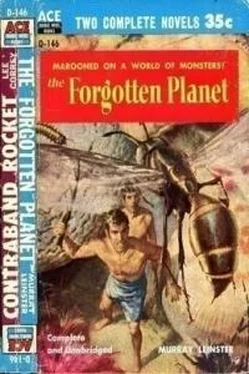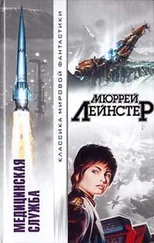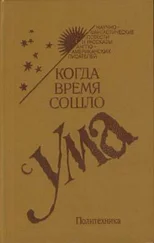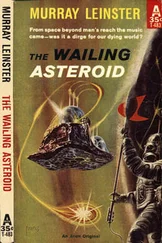The dogs regarded the men with their heads on one side, sniffing in the deepest possible amazement,—amazement so intense that they could not possibly feel hostility. One of them whined a little because he did not understand.
Peculiarly enough, it was a matter of topography. The plateau which reached above the clouds rose with a steep slope from the valley from which a hunting–spider's brood had driven the men. This was on the eastern edge of the plateau. On the west, however, the highland was subject to an indentation which almost severed it. No more than twenty miles from where Burl's group had climbed to sunshine, there was a much more gradual slope downward. There, mushroom–forests grew almost to the cloud–layer. From there, giant insects strayed up and onto the plateau itself.
They could not live above the clouds, of course. There was not food enough for their insatiable hunger. Especially at night, it was too cold to allow them to stay active. But they did stray from their normal environment, and some of them did reach the sunshine, and perhaps some of them blundered back down to their mushroom–forests again. But those which did not stumble back were chilled to torpor during their first night underneath the stars. They were only partly active on the second day,—if, indeed, they were active at all. Few or none recovered from their second nights' coldness. None at all kept their full ferocity and deadliness.
And this was how the dogs survived. They were certainly descended from dogs on the wrecked space–ship—the Icarus —whose crew had landed on this planet some forty–odd human generations since. The humans of today had no memories of the ship, and the dogs surely had no traditions. But just because those early dogs had less intelligence, they had more useful instincts. Perhaps the first generations of castaways bred dogs in their first few desperate centuries, hoping that dogs could help them survive. But no human civilization could survive in the lowlands. The humans went back to the primitive state of their race and lived as furtive vermin among monsters. Dogs could not survive there, though humans did linger on, so somehow the dogs took to the heights. Perhaps dogs survived their masters. Perhaps some were abandoned or driven away. But dogs had reached the highlands. And they did survive because giant insects blundered up after them,—and could not survive in a proper environment for dogs and men.
There was even reason for the dogs remaining limited in number, and keenly intelligent. The food–supply was limited. When there were too many dogs, their attacks on stumbling insect giants were more desperate and made earlier, before the monsters' ferocity was lessened. So more dogs died. Then there was an adjustment of the number of dogs to the food–supply. There was also a selection of those too intelligent to attack rashly. Yet those who had insufficient courage would not eat.
In short, the dogs who now regarded men with bright, interested eyes were very sound dogs. They had the intelligence needed for survival. They did not attack anything imprudently, but they also knew that it was not necessary to be more than reasonably wary of insects in general,—not even spiders unless they were very newly arrived from the steaming lowlands. So the dogs regarded men with very much the same astonished interest with which the men regarded the dogs.
Burl saw immediately that the dogs did not act with the blind ferocity of insects, but with an interested, estimative intelligence strikingly like that of men. Insects never examined anything. They fled or they fought. Those who were not carnivorous had no interest in anything but food, and those who were meat–eaters lumbered insanely into battle at the bare sight of possible prey. The dogs did neither. They sniffed and they considered.
Burl said sharply to his followers:
"Stay here!"
He walked slowly down into the amphitheatre. Saya followed him instantly. Dogs moved warily aside. But they raised their noses and sniffed. They were long, luxurious sniffs. The smell of human kind was a good smell. Dogs had lived hundreds of their generations without having it in their nostrils, but before that there were thousands of generations to whom that smell was a necessity.
Burl reached the object the dogs had been attacking. It lay on the grass, throbbing painfully. It was the larva of an azure–blue moth which spread ten–foot wings at nightfall. The time for its metamorphosis was near, and it had traveled blindly in search of a place where it could spin its cocoon safely and change to its winged form. It had come to another world,—the world above the clouds. It could find no proper place. Its stores of fat had protected it somewhat from the chill. But the dogs had found it as it crawled blindly—.
Burl considered. It was the custom of wasps to sting creatures like this at a certain special spot,—apparently marked for them by a tuft of dark fur.
Burl thrust home with his lance. The point pierced that particular spot. The creature died quickly and without agony. The thought to kill was an inspiration. Then instinct followed. Burl cut off meat for his tribesmen. The dogs offered no objection. They were well–fed enough. Burl and Saya, together, carried the meat back to the other tribesfolk. On the way Burl passed within two yards of a dog which regarded him with extreme intentness and almost a wistful expression. Burl's smell did not mean game. It meant—something the dog struggled helplessly to remember. But it was good.
"I have killed the thing," said Burl to the dog, in the tone of one addressing an equal. "You can go and eat it now. I took only part of it."
Burl and his people ate of what he had brought back. Many of the dogs—most of them—went to the feast Burl had left. Presently they were back. They had no reason to be hostile. They were fed. The humans offered them no injury, and the humans smelled of something that appealed to the deepest well–springs of canine nature.
Presently the dogs were close about the humans. They were fascinated. And the humans were fascinated in return. Each of the people had a little of the feeling that Burl had experienced as the tribal leader. In the intent, absorbed and wholly unhostile regard of the dogs, even children felt flattered and friendly. And surely in a place where everything else was so novel and so satisfactory, it was possible to imagine friendliness with creatures which were not human, since assuredly they were not insects.
A similar state of mind existed among the dogs.
Saya had more meat than she desired. She glanced among the members of the tribe. All were supplied. She tossed it to a dog. He jerked away alertly, and then sniffed at it where it had dropped. A dog can always eat. He ate it.
"I wish you would talk to us," said Saya hopefully.
The dog wagged his tail.
"You do not look like us," said Saya interestedly, "but you act like we do. Not like the—Monsters."
The dog looked significantly at meat in Burl's hand. Burl tossed it. The dog caught it with a quick snap, swallowed it, wagged his tail briefly and came closer. It was a completely incredible action, but dogs and men were blood–kin on this planet. Besides, there was racial–memory rightness in friendship between men and dogs. It was not hindered by any past experience of either. They were the only warm–blooded creatures on this world. It was a kinship felt by both.
Presently Burl stood up and spoke politely to the dog. He addressed him with the same respect he would have given to another man. In all his life he had never felt equal to an insect, but he felt no arrogance toward this dog. He felt superior only to other men.
"We are going back to our cave," he said politely. "Maybe we will meet again."
Читать дальше







